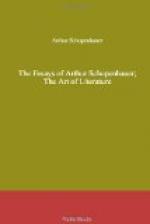What the address is to a letter, the title should be to a book; in other words, its main object should be to bring the book to those amongst the public who will take an interest in its contents. It should, therefore, be expressive; and since by its very nature it must be short, it should be concise, laconic, pregnant, and if possible give the contents in one word. A prolix title is bad; and so is one that says nothing, or is obscure and ambiguous, or even, it may be, false and misleading; this last may possibly involve the book in the same fate as overtakes a wrongly addressed letter. The worst titles of all are those which have been stolen, those, I mean, which have already been borne by other books; for they are in the first place a plagiarism, and secondly the most convincing proof of a total lack of originality in the author. A man who has not enough originality to invent a new title for his book, will be still less able to give it new contents. Akin to these stolen titles are those which have been imitated, that is to say, stolen to the extent of one half; for instance, long after I had produced my treatise On Will in Nature, Oersted wrote a book entitled On Mind in Nature.
A book can never be anything more than the impress of its author’s thoughts; and the value of these will lie either in the matter about which he has thought, or in the form which his thoughts take, in other words, what it is that he has thought about it.
The matter of books is most various; and various also are the several excellences attaching to books on the score of their matter. By matter I mean everything that comes within the domain of actual experience; that is to say, the facts of history and the facts of nature, taken in and by themselves and in their widest sense. Here it is the thing treated of, which gives its peculiar character to the book; so that a book can be important, whoever it was that wrote it.
But in regard to the form, the peculiar character of a book depends upon the person who wrote it. It may treat of matters which are accessible to everyone and well known; but it is the way in which they are treated, what it is that is thought about them, that gives the book its value; and this comes from its author. If, then, from this point of view a book is excellent and beyond comparison, so is its author. It follows that if a writer is worth reading, his merit rises just in proportion as he owes little to his matter; therefore, the better known and the more hackneyed this is, the greater he will be. The three great tragedians of Greece, for example, all worked at the same subject-matter.
So when a book is celebrated, care should be taken to note whether it is so on account of its matter or its form; and a distinction should be made accordingly.
Books of great importance on account of their matter may proceed from very ordinary and shallow people, by the fact that they alone have had access to this matter; books, for instance, which describe journeys in distant lands, rare natural phenomena, or experiments; or historical occurrences of which the writers were witnesses, or in connection with which they have spent much time and trouble in the research and special study of original documents.




